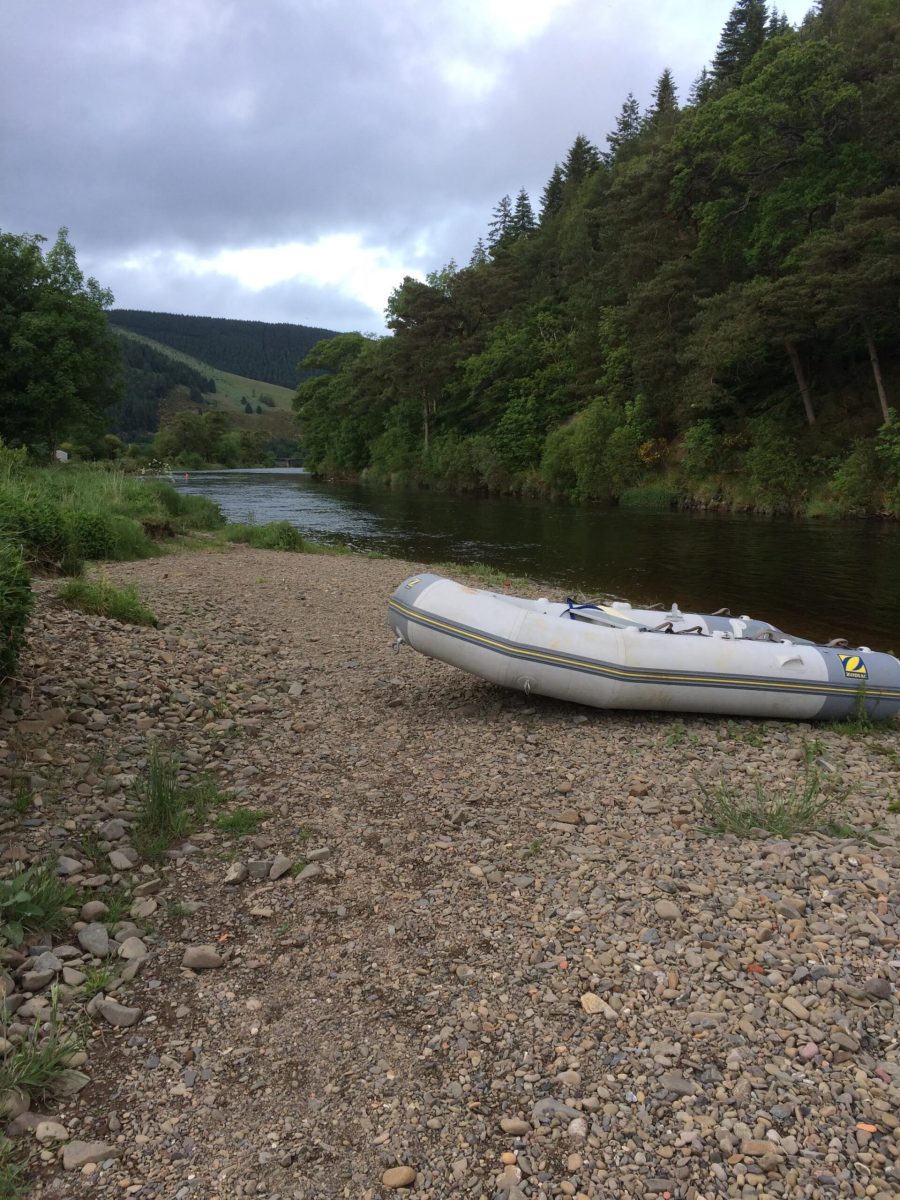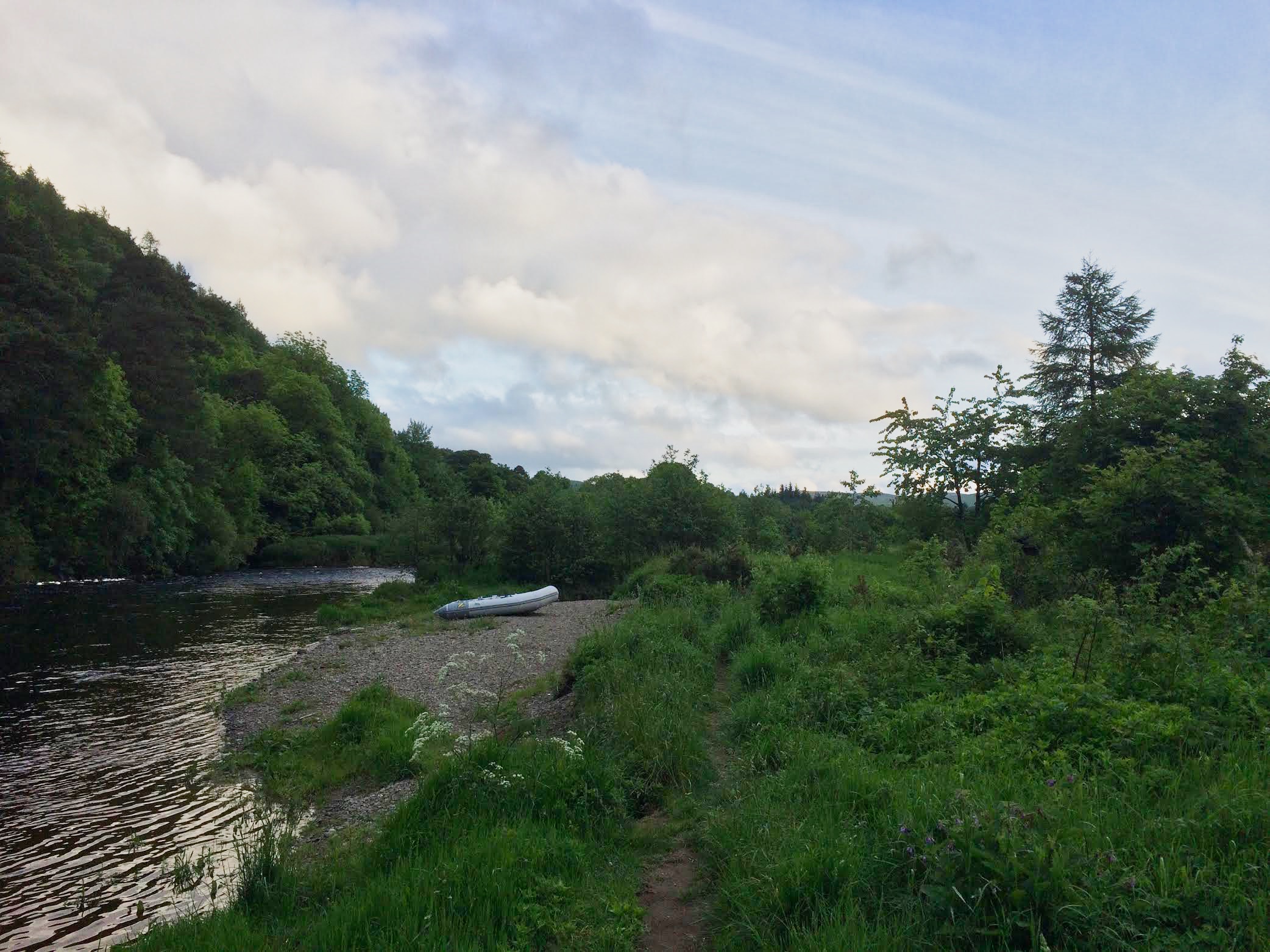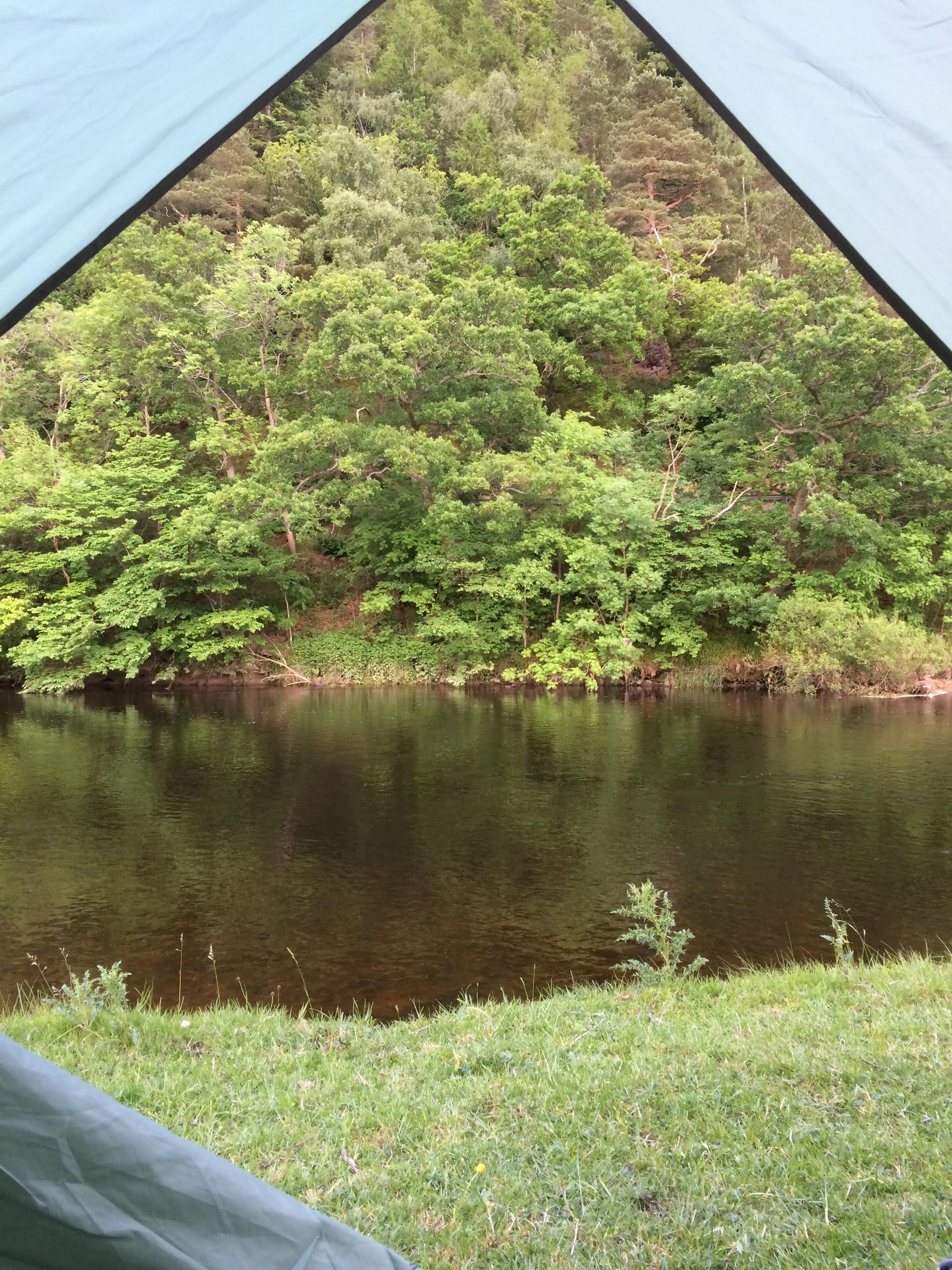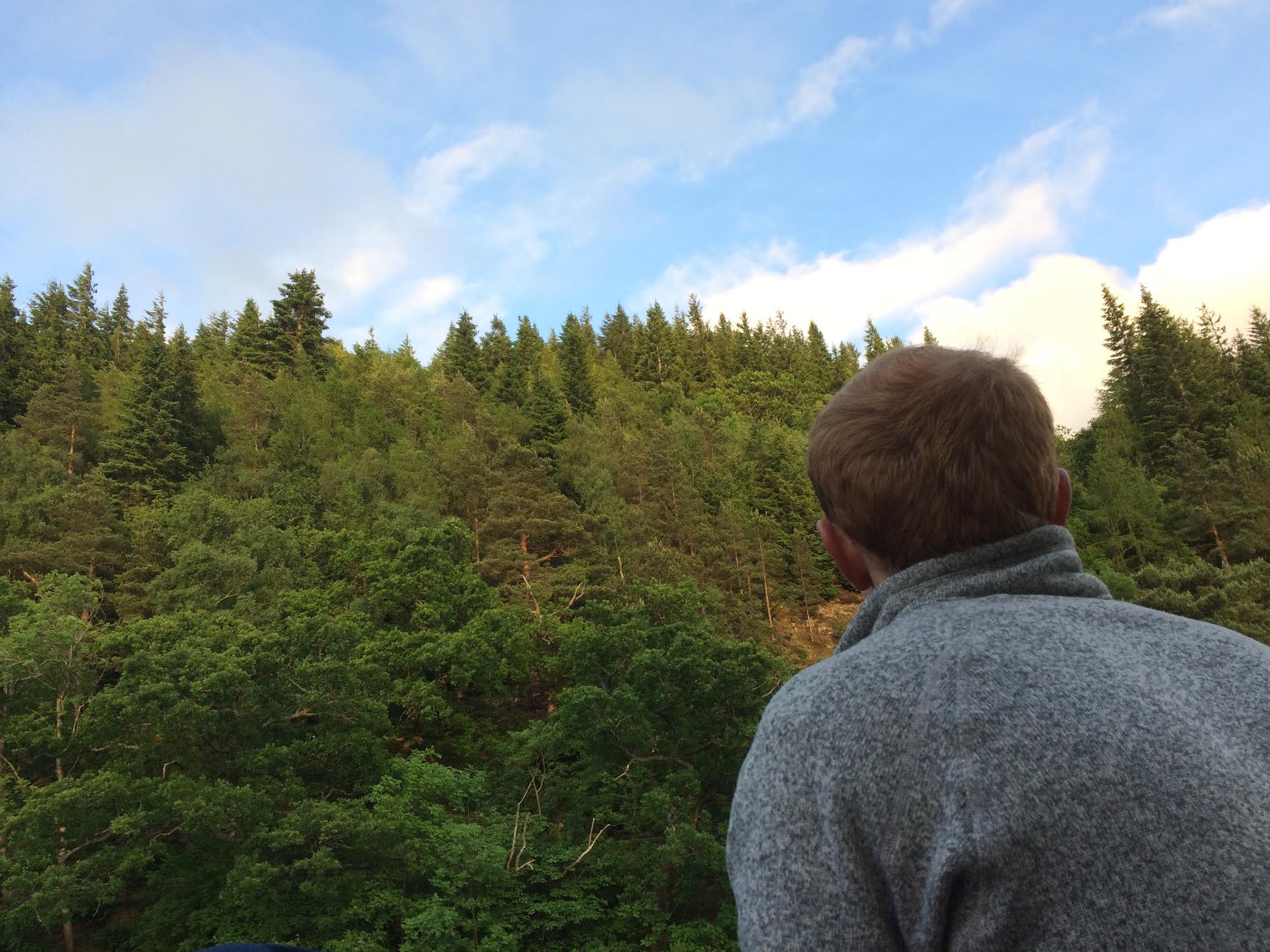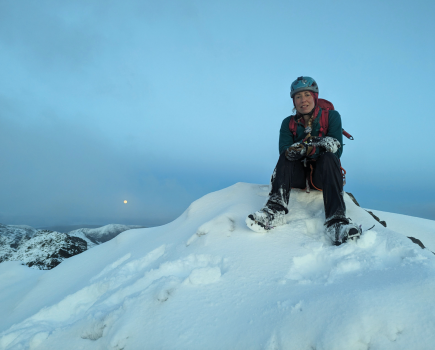“When your idea of yourself is bound to misshapen adventures and the movement of water, the only way to satisfy that need is to go down to the river”
Other digital features by Adam Boggon
- Confusion in East Africa
- Saga of Magnus – an Orkney journey
- Down to the river – mucking about in boats in the Borders
- Snowbound
Mucking about in boats in the Borders
By Adam Boggon. All images © Jenni Galloway.
Spectacles of mounting ludicrousness have always appealed to me. The water-borne adventure is a medium conducive to both liberation and farce. I’ve discovered a successful recipe: assemble an unlikely crew, select a river at the edge of your ability to negotiate, bring a novelty item, and expect to get wet.
These trips are sentimental journeys too. I think of Ratty in The Wind in the Willows,and my own father piloting a wooden Canadian canoe around the trunk of a submerged tree: broken boats sink. I think of taking a blow-up raft with friends down the River Tay to my graduation ball in Dunkeld. People long for all sorts of things. When a night shift goes awry or I begin to feel crushed by an exhausting schedule I long to be cavorting round hazards and paddling in the current. When these feelings come to me I find it best to start making plans: when your idea of yourself is bound to misshapen adventures and the movement of water, the only way to satisfy that need is to go down to the river.
“I’m bringing a king-sized inflatable mattress and a duck-down duvet. No point being uncomfortable. I don’t like sleeping bags.”
When summer came I decided to make a trip down the Tweed. I worked in the Scottish Borders for eight months after finishing medical school and it’s a part of the world I love to return to. I recruited my friend Jenni Galloway. She’d never been on a boat in a river before or camped outside her back garden. But she’s a lively companion and laughs at some of my jokes. She might also lure Rob Torrance and his inflatable boat. Surely the pull of a voyage by river with two ginger-haired pals would be too strong to resist?
My supposition was correct: Rob agreed to drive from Liverpool and would permit the use of his raft. Though he brought some unusual views on camping gear: “I’m bringing a king-sized inflatable mattress and a duck-down duvet. No point being uncomfortable. I don’t like sleeping bags.”
I considered the doubtful usefulness and portability of a wet down duvet, but came to accept that it was Rob’s boat, Rob’s body, and it would be Rob’s problem if his massive feathery nest got wet before he’d had use of it.
I placed a call to my favourite coffee shop in the Borders: No. 1 Peebles Road in Innerleithen. A burly man called Craig works there and I once observed him doing push-ups out the back of the cafe. On a winter’s day he drew me a map depicting little-known mountain bike trails on the back of a paper bag. He was the man I needed to speak to.
“Quick question. How much water is in the Tweed at the moment and do you reckon it’s high enough to get a boat down?”
“Aye you’ll have no bother. There’s a decent flow going under the bridge.”
The advantages of having a man in the know beside the river should not be underestimated. I picked up Jenni from her flat and we headed south. We found Rob waiting in the shade beside Melrose Abbey and drove to Peebles. We took turns at inflating the boat and were soon ready to begin. We slid the raft down the steep bank, stepped in one by one, and floated out into the middle of the stream.
It didn’t matter that we were starting later than intended. The June evening would stretch all the way out to 10pm and we only planned to cover a 16km stretch to Innerleithen. It was cool enough for a jacket but other than a few fat droplets of rain the weather remained fine as afternoon became early evening. A slight breeze pushed at our backs and made paddling easier. Beside the river were high banks where sand martins nested. On the water were mallards and a family of mergansers in a line hurrying ahead of the boat. A kingfisher dashed past in a blur of blue and dusty orange.
I took a length of strapping from a pocket of my dry bag and tied a knot around the neck of a bottle of Prosecco. The other end was looped around a handle in the middle of the raft and I let the wine dangle into the flow. By the time we came to Innerleithen it was cool.
We found a patch of grass out of sight of the village on which to pitch the tent. We washed in the river and changed into neater clothes. Before dinner we sat out on the river bank and passed around the wine, our feet dangling above the surface as we looked on the woodland that climbed up to the horizon on the other side of the stream.
Returning from dinner some hours later it became clear that Rob’s enormous mattress had acquired a puncture. We were tired though and all fell asleep quickly in spite of our bedding – which offered scant protection from the ground, and which gave an unpleasant drowning sensation whenever you tried to move. Mercifully the duvet had survived the day without getting wet and I was grateful to be able to steal a corner of it to make my own rest a little cosier.
Morning came and we were joined in the boat by Ciara Menzies. As the sun climbed higher a sleepiness settled over the crew. We lobbed Rob’s American football ahead of us; passing under bridges, we flung the ball across the span, trying to land it in the boat on the other side. We never succeeded.
Other than when tossing the ball, Rob only stirred from his lassitude when approaching fishermen. They must pay to access the riverbank and sometimes prickle toward boaters. Rob, an occasional angler, was keen to ensure correct etiquette when passing: keep quiet, don’t paddle too much, give a wide berth, maintain a respectful facial expression, and say “tight lines” once you’ve gone by.
Ultimately, my ejection from the craft became irrefutable. Resigned, I allowed myself to topple backwards into the moving water
It should be noted that not all who take fish from the river observe this tweed-and-galoshes model of good form. I know this from a conversation in a local A&E department. A paunchy man with gallstones cracked a grin of gold-capped teeth when I asked what he did for a living:
“Hunting rats, mostly. I’ve got a dog that chases them and a decent gun. The farmers pay cash in hand. Then I take a few fish at night now and then.”
“Poaching?”
“Aye.”
He explained the method: find a secluded spot along the river, set up a big net across the breadth of it, then wade in and use a bright flashlight to corral the startled fish into the net. Meanwhile his wife stood guard at a higher point along the road and flashed him a warning signal if trouble approached. He stowed his illicit cargo in a freezer box on the back of an old motorbike and drove through the night to Newcastle’s less scrupulous restaurants. They would ask him no questions and he would tell them no lies.
We approached the first major rapid on the river sideways. This is not the recommended procedure. The Fairnilee rapid begins with a considerable drop, so it’s important to be ready for it. But for some reason Rob wrested control of the steering and made straight for a large rock on the far left side of the watercourse. A few moments of disorderly shouting followed as Ciara and I struggled to pivot the boat and set us into the rapid facing forward. This was not achieved by the time we started bouncing down the slalom course. We made it to the bottom unscathed but had we managed the rapid like that in a Canadian canoe we would certainly have sunk.
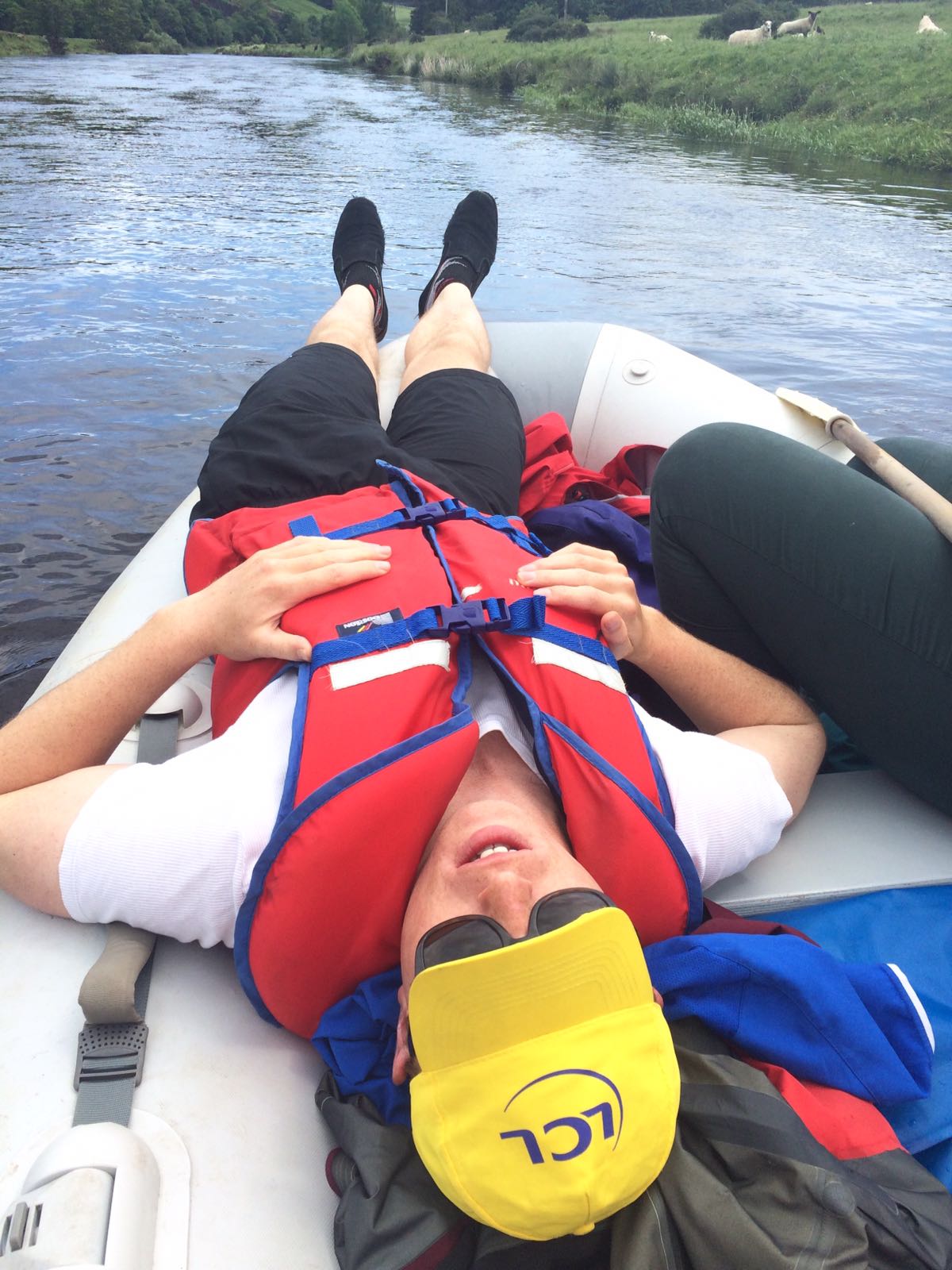 The river broadened and slowed and Rob rolled out of the boat for a swim. He fell behind and lolled in the water – putting on goggles to explore below the surface. He was still upstream when we spotted the next rapid. Above the point where it kicked in I spied a fallen tree and suggested we moor there to let Rob get back in the boat. We steered the raft carefully alongside the tree but misjudged the pull of the current. It hemmed the boat into a tangle of branches. We started to take on water and the stern became submerged. Ciara stepped forward to shift the balance in the boat and I planned an extrication from our unforeseen treeing by using paddles to lever the boat backwards into the flow. The heave of the water scuttled this plan before complete formulation and I began slowly to be lifted from the back of the raft into the limbs of the tree itself.
The river broadened and slowed and Rob rolled out of the boat for a swim. He fell behind and lolled in the water – putting on goggles to explore below the surface. He was still upstream when we spotted the next rapid. Above the point where it kicked in I spied a fallen tree and suggested we moor there to let Rob get back in the boat. We steered the raft carefully alongside the tree but misjudged the pull of the current. It hemmed the boat into a tangle of branches. We started to take on water and the stern became submerged. Ciara stepped forward to shift the balance in the boat and I planned an extrication from our unforeseen treeing by using paddles to lever the boat backwards into the flow. The heave of the water scuttled this plan before complete formulation and I began slowly to be lifted from the back of the raft into the limbs of the tree itself.
Ultimately, my ejection from the craft became irrefutable. Resigned, I allowed myself to topple backwards into the moving water.
I surfaced and grabbed onto the back of the boat. Rob had caught up with us and together we grappled with branches and the tugging water while Jenni and Ciara used the paddles to prize the boat out of the fallen tree. The point of equilibrium eventually reached, the current heaved the raft around and into the rapid backwards. Rob and I hauled ourselves back in as the boat was swept downstream.
Though my ingress had been involuntary I found the water pleasant. So I stood on the prow and jumped back into the river. I kept my lifejacket on and let myself float downstream lying on my back. We spent an hour like this – flopping in and out of the boat, enjoying the long afternoon under the sun. By the time the cold had worked its way into my bones we had almost reached Abbotsford, home of Walter Scott.
From this point there remained only a few bends in the river between Galashiels and Melrose. This is the part of the Borders I know best and I let my mind spool backwards as I gazed down to the river and up to the rounded tops of the Eildon hills. In my reverie I could see the squash court in the hospital residences chipped and worn at the hitting wall, and the patch of shaded grass where on summer evenings I sat with the rest of the junior staff drinking cold beer after work. I could see the pathway from the hospital to Burt’s Hotel where we went for dinner on Thursday nights. I saw the road out to Glentress where I mountain biked with my flatmate Joe. I saw the cricket pitch and the marquee where on the last weekend of July the entire staff – cleaners, house officers, nurses, consultants, pharmacists and the medical director – assembled on the lawn for the Borders Bash, the party ricocheting through the night from 6pm until the last revellers shambled into bed in the dawn of the following day. I saw difficult things also – long, hectic days and nights in unpredictable wards. Formative crises. Occasional spirited disagreements. I saw the face of one with whom I had felt whole. I saw, in short, a place in which for a time I had in some sense belonged. It was good to be back.

